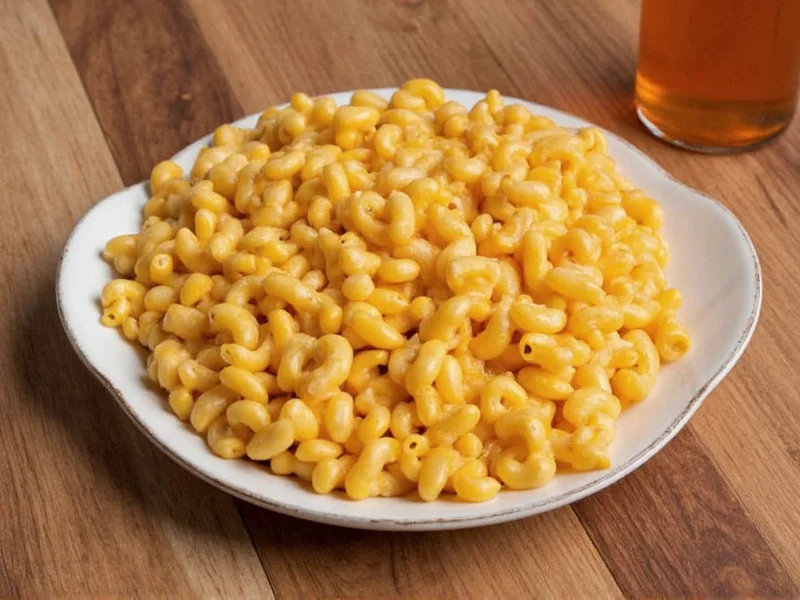Understanding the shelf life of mac and cheese is essential for both food safety and minimizing waste. Whether you're dealing with a box from your pantry or leftovers in the fridge, knowing exactly how long mac and cheese lasts prevents potential foodborne illness while helping you make the most of your meals.
Decoding Mac and Cheese Expiration Dates
Many consumers confuse "best by," "sell by," and "use by" dates on packaged foods. For dry boxed mac and cheese, these dates primarily indicate peak quality rather than safety. The USDA confirms that shelf-stable pantry items like unopened macaroni and cheese remain safe well beyond printed dates when stored correctly in cool, dry conditions.
However, once you've prepared homemade mac and cheese or cooked a boxed version, the clock starts ticking much faster. Bacterial growth accelerates in cooked dairy-based dishes, making proper refrigeration critical.
Mac and Cheese Shelf Life Breakdown
| Type of Mac and Cheese | Pantry (Unopened) | Refrigerator (Opened/Cooked) | Freezer |
|---|---|---|---|
| Unopened boxed | 1-2 years past date | N/A | Not recommended |
| Cooked boxed version | N/A | 3-5 days | 1-2 months |
| Homemade (with dairy) | N/A | 3-4 days | 1-2 months |
| Mac and cheese casserole | N/A | 3-5 days | 2-3 months |
How to Tell If Mac and Cheese Has Gone Bad
Recognizing signs that mac and cheese has spoiled requires attention to multiple sensory indicators. Don't rely solely on the expiration date—always perform these checks:
- Visual inspection: Look for mold growth (fuzzy spots in white, green, or black), separation of ingredients, or unusual discoloration
- Smell test: Spoiled mac and cheese develops a sour, unpleasant odor distinct from its normal cheesy aroma
- Texture check: Slimy pasta or curdled sauce indicates bacterial growth
- Taste (only if other signs absent): If it tastes unusually sour or off, discard immediately
When evaluating does boxed mac and cheese expire in your pantry, check for compromised packaging, insect activity, or moisture inside the box—all signs of potential contamination.
Maximizing Freshness: Proper Storage Techniques
Extending the shelf life of mac and cheese requires proper storage methods. For how long does mac and cheese last in the fridge, follow these science-backed practices:
Refrigerate cooked mac and cheese within two hours of preparation in airtight containers. Divide large portions into smaller containers to cool faster and minimize temperature fluctuations. Maintain your refrigerator at 40°F (4°C) or below—the temperature danger zone for perishable foods begins at 40°F.
For freezing, use heavy-duty freezer bags or rigid containers with minimal air space. Label with preparation date since frozen mac and cheese shelf life is limited. Thaw overnight in the refrigerator rather than at room temperature to prevent bacterial growth.
Food Safety Considerations
Consuming spoiled mac and cheese carries genuine health risks. Dairy-based dishes provide ideal conditions for bacteria like Staphylococcus aureus and Bacillus cereus to multiply rapidly. These pathogens cause food poisoning symptoms including nausea, vomiting, and diarrhea.
When in doubt about can you eat expired mac and cheese, follow the USDA's clear guidance: "When food looks or smells bad, throw it out." No amount of reheating eliminates all toxins produced by certain bacteria. The "sniff test" alone isn't sufficient for dairy products, as harmful bacteria may not produce noticeable odors.
Special caution is needed for vulnerable populations including young children, pregnant women, older adults, and immunocompromised individuals. For these groups, adhering strictly to mac and cheese expiration guidelines is particularly important.
Common Misconceptions About Mac and Cheese Expiration
Several myths persist about food expiration that apply to mac and cheese. Many believe that freezing stops all degradation—but while it halts bacterial growth, freezer burn and texture changes still occur over time. Others think the "best by" date equals a hard expiration, leading to unnecessary food waste.
Understanding the difference between food safety and food quality helps make informed decisions. Your unopened box of mac and cheese might lose some flavor intensity after the printed date, but remains safe if stored properly and shows no signs of spoilage.











 浙公网安备
33010002000092号
浙公网安备
33010002000092号 浙B2-20120091-4
浙B2-20120091-4